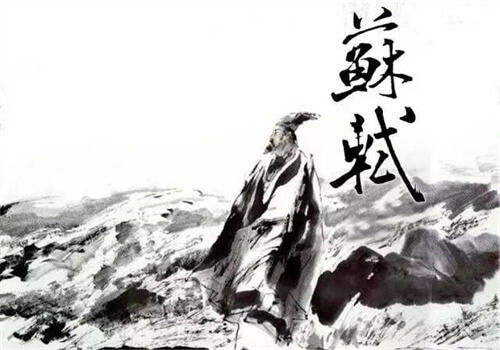 卜算子
卜算子
黄州定慧院[1]寓居[2]作
苏轼
缺月挂疏桐,
漏断[3]人初静。
谁见幽人独往来,
飘渺孤鸿影。
惊起却回头,
有恨无人省[4]。
拣尽寒枝不肯栖,
寂寞沙洲[5]冷。
注释:
[1]定慧院:又名定慧寺,在黄州东南。
[2]寓居:寓所,住处。
[3]漏断:漏壶水已滴尽,指夜色将尽。漏,古代的计时工具,用铜制成,上下分好几层,上层底有小孔,可以滴水,层层下注,以底层蓄水多少计算时间。
[4]省(xǐnɡ):了解。
[5]沙洲:江河中由泥沙淤积而成的小块陆地。
Song of Divination
· Write in Ding Hui Temple in Huangzhou
Su Shi
From a sparse plane tree hangs the waning moon;
The water clock is still and hushed is man.
Who sees a hermit pacing up and down alone?
Is it the shadow of a swan?
Startled, he turns his head.
With a grief none behold.
Looking all over, he won’t perch on branches dead.
But on the lonely sandbank cold.
注释:
The poet feels lonely as a swan after his banishment to Huangzhou by the side of the Yangzi River.

《卜算子·黄州定慧院寓居作》是宋代文学家苏轼的词作。此词上阕写鸿见人,下阕写人见鸿,借月夜孤鸿这一形象托物寓怀,表达了词人孤高自许、蔑视流俗的心境。全词借物比兴,写景兴怀,托物咏人,物我交融,含蕴深广,风格清奇,为词中名篇。
The lyrics of “Song of Divination · Write in Ding Hui Temple in Huangzhou” are written by Su Shi, a writer of the Song Dynasty. In the first section, he writes that Hong sees people, and in the second section, he writes that people see Hong, using the image of a lonely Hong on a moonlit night to express his lonely and self-proclaimed state of mind and contempt for the commonplace. The whole lyric makes use of objects to compare with each other, to write the scene and to express the feelings of the people, and to blend the things with me, with a deep and broad meaning, and with a clear and strange style.







